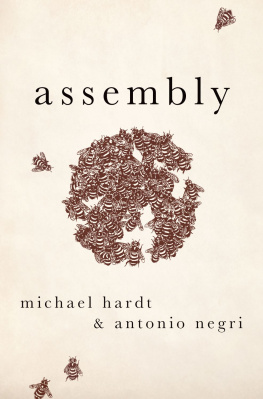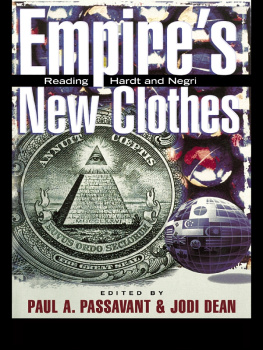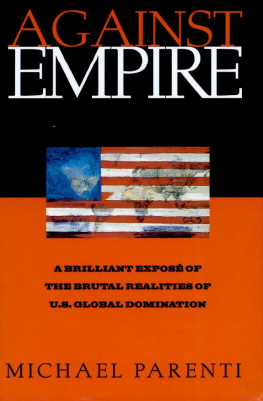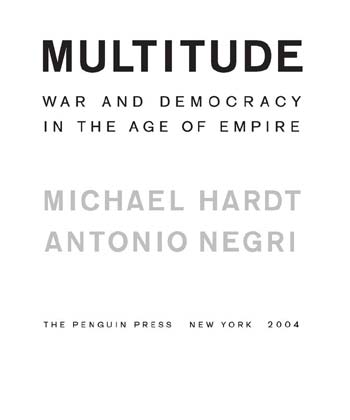ALSO BY MIC HAEL HARDT AND ANTONIO NEGRI
Empire
Labor of Dionysus: A Critique of the State-Form
ALSO BY ANTONIO NEGRI
Negri on Negri: In Conversation with Anne Dufourmantelle
(translated by Malcolm B. DeBevoise)
Time for Revolution (translated by Matteo Mandarini)
Insurgencies: Constituent Power and the Modern State
(translated by Maurizia Boscagli)
(with Felix Guattari) Communists Like Us
(translated by Michael Ryan)
The Politics of Subversion: A Manifesto for the 21st Century
(translated by James Newell)
The Savage Anomaly: The Power of Spinozas Metaphysics and Politics
(translated by Michael Hardt)
Revolution Retrieved
ALSO BY MICHAEL HARDT
Gilles Deleuze: An Apprenticeship in Philosophy
THE PENGUIN PRESS
a member of
Penguin Group (USA) Inc.
375 Hudson Street
New York, New York 10014
Copyright Michael Hardt and Antonio Negri, 2004
All rights reserved
LIBRARY OF CONGRESS CATALOGING-IN-PUBLICATION DATA
Hardt, Michael.
Multitude : war and democracy in the Age of Empire / Michael Hardt and Antonio Negri.
p. cm.
Sequel to: Empire.
Includes index.
ISBN : 978-1-1010-1041-9
1. Democracy. 2. Internationalism. 3. Globalization. 4. International relations. 5. War.
6. Imperialism. I. Negri, Antonio, 1933- II. Title.
JC423.H
321.8dc22
This book is printed on acid-free paper.

.
Without limiting the rights under copyright reserved above, no part of this publication may be reproduced, stored in or introduced into a retrieval system, or transmitted, in any form or by any means (electronic, mechanical, photocopying, recording or otherwise), without the prior written permission of both the copyright owner and the above publisher of this book.
The scanning, uploading, and distribution of this book via the Internet or via any other means without the permission of the publisher is illegal and punishable by law. Please purchase only authorized electronic editions and do not participate in or encourage piracy of copyrighted materials. Your support of the authors rights is appreciated.
http://us.penguingroup.com
PREFACE: LIFE IN COMMON
The possibility of democracy on a global scale is emerging today for the very first time. This book is about that possibility, about what we call the project of the multitude. The project of the multitude not only expresses the desire for a world of equality and freedom, not only demands an open and inclusive democratic global society, but also provides the means for achieving it. That is how our book will end, but it cannot begin there.
Today the possibility of democracy is obscured and threatened by the seemingly permanent state of conflict across the world. Our book must begin with this state of war. Democracy, it is true, remained an incomplete project throughout the modern era in all its national and local forms, and certainly the processes of globalization in recent decades have added new challenges, but the primary obstacle to democracy is the global state of war. In our era of armed globalization, the modern dream of democracy may seem to have been definitively lost. War has always been incompatible with democracy. Traditionally, democracy has been suspended during wartime and power entrusted temporarily to a strong central authority to confront the crisis. Because the current state of war is both global in scale and long lasting, with no end in sight, the suspension of democracy too becomes indefinite or even permanent. War takes on a generalized character, strangling all social life and posing its own political order. Democracy thus appears to be entirely irretrievable, buried deep beneath the weapons and security regimes of our constant state of conflict.
Yet never has democracy been more necessary. No other path will provide a way out of the fear, insecurity, and domination that permeates our world at war; no other path will lead us to a peaceful life in common.
This book is the sequel to our book Empire, which focused on the new global form of sovereignty. That book attempted to interpret the tendency of global political order in the course of its formation, that is, to recognize how from a variety of contemporary processes there is emerging a new form of global order that we call Empire. Our point of departure was the recognition that contemporary global order can no longer be understood adequately in terms of imperialism as it was practiced by the modern powers, based primarily on the sovereignty of the nation-state extended over foreign territory. Instead, a network power, a new form of sovereignty, is now emerging, and it includes as its primary elements, or nodes, the dominant nation-states along with supranational institutions, major capitalist corporations, and other powers. This network power we claim is imperial not imperialist. Not all the powers in Empires network, of course, are equalon the contrary, some nation-states have enormous power and some almost none at all, and the same is true for the various other corporations and institutions that make up the networkbut despite inequalities they must cooperate to create and maintain the current global order, with all of its internal divisions and hierarchies.
Our notion of Empire thus cuts diagonally across the debates that pose unilateralism and multilateralism or pro-Americanism and anti-Americanism as the only global political alternatives. On the one hand, we argued that no nation-state, not even the most powerful one, not even the United States, can go it alone and maintain global order without collaborating with the other major powers in the network of Empire. On the other hand, we claimed that the contemporary global order is not characterized and cannot be sustained by an equal participation of all, or even by the set of elite nation-states, as in the model of multilateral control under the authority of the United Nations. Rather, severe divisions and hierarchies, along regional, national, and local lines, define our current global order. Our claim is not simply that unilateralism and multilateralism as they have been presented are not desirable but rather that they are not possible given our present conditions and that attempts to pursue them will not succeed in maintaining the current global order. When we say that Empire is a tendency we mean that it is the only form of power that will succeed in maintaining the current global order in a lasting way. One might thus respond to the U.S. unilateralist global projects with the ironic injunction adapted from the Marquis de Sade: Amricains, encore un effort si vous voulez tre imperials! (Americans, you need to try harder if you want to be imperial!).
Empire rules over a global order that is not only fractured by internal divisions and hierarchies but also plagued by perpetual war. The state of war is inevitable in Empire, and war functions as an instrument of rule. Todays imperial peace, Pax Imperii, like that in the times of ancient Rome, is a false pretense of peace that really presides over a state of constant war. All of that analysis of Empire and global order, however, was part of the previous book and there is no need for us to repeat it here.







